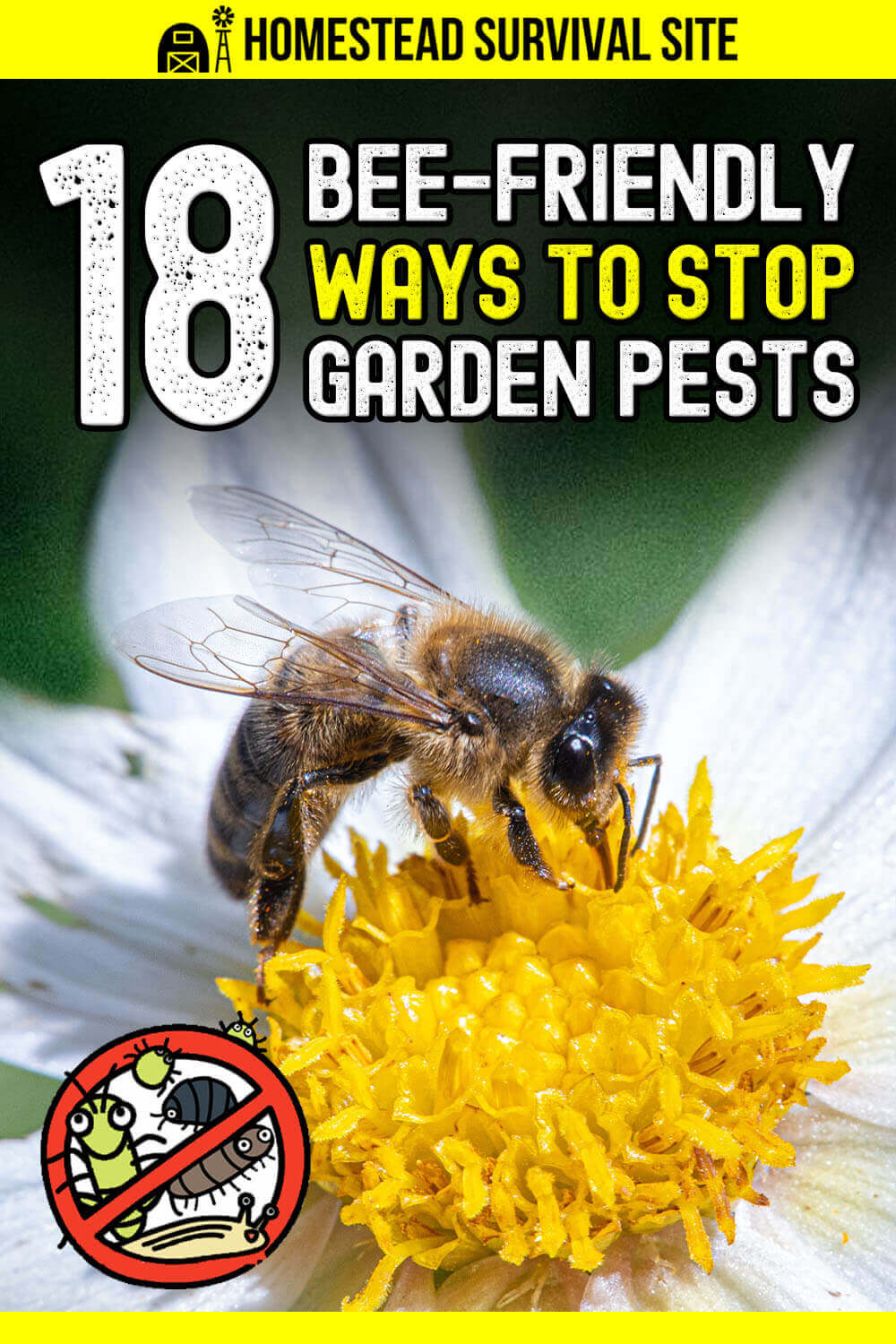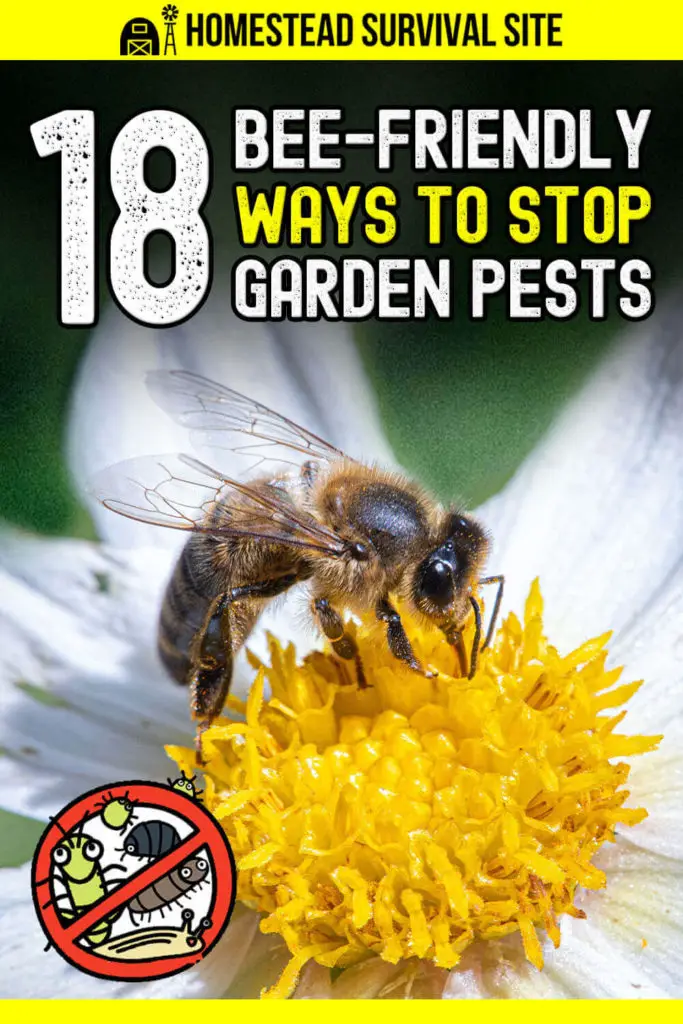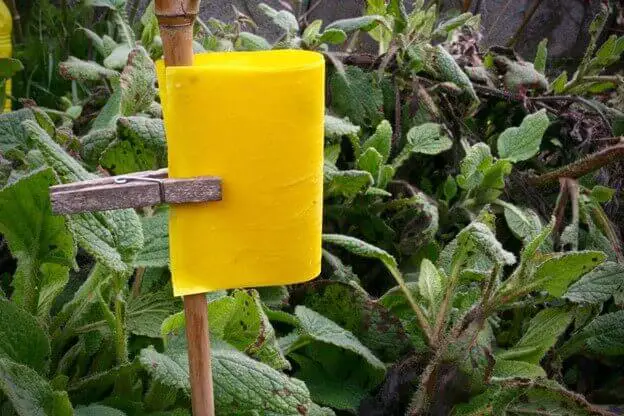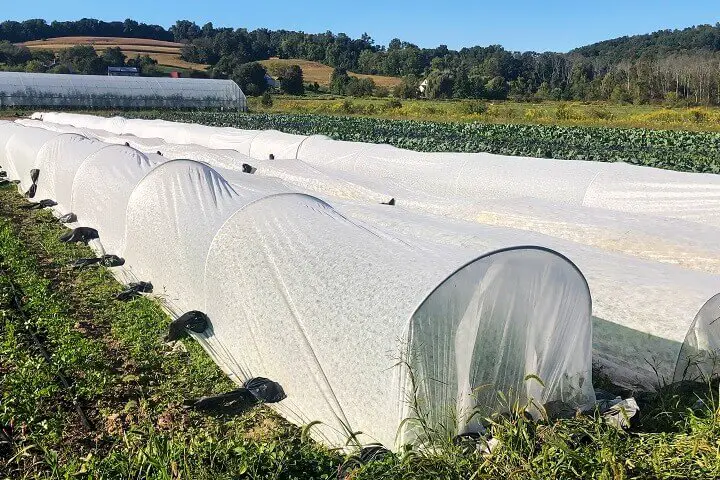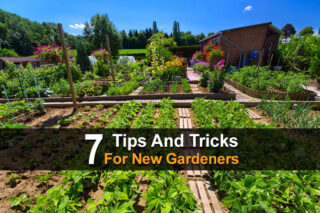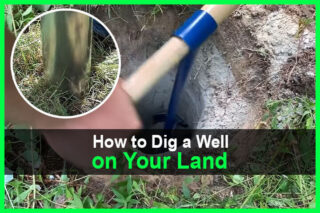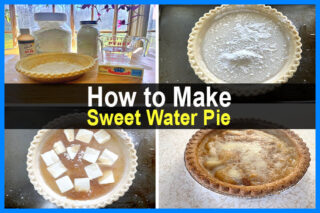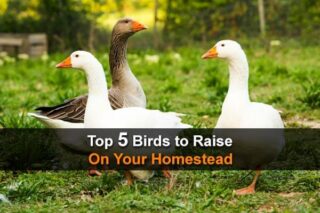Estimated reading time: 11 minutes
There are few things more frustrating in a garden than pests. Whether it's chewing on your plants or spreading diseases, pests can quickly take over and ruin all your hard work.
But don't worry, there are ways to fight back! Bee-friendly solutions like companion planting and attractant plants can help keep garden pests at bay without the use of harsh chemicals.
Read on for more tips on how to keep your garden pest-free. By following these tips, you can get rid of garden pests without harming bees or using harmful chemicals.
Want to save this post for later? Click Here to Pin It On Pinterest!
1. Plant Bee-Friendly Flowers
Every year, gardeners across the country battle against pests that damage their plants and reduce yields. While there are a number of chemical pesticides on the market, these products can be costly and may have harmful side effects.
Fortunately, there is a more natural solution: plant bee-friendly flowers. Bees are nature's most efficient pollinators, and they will help to ensure that your plants are properly fertilized.
To attract bees, plant flowers that bloom at different times throughout the season. Bee Balm, Borage, and Catnip are all great choices. In addition, make sure to provide a water source for the bees. A simple bird bath or shallow dish filled with pebbles will do the trick.
2. Use Organic Gardening Methods and Avoid Using Pesticides
When it comes to protecting your garden from pests, there are a variety of methods you can use. However, many of these methods involve the use of harmful pesticides that can also damage beneficial insects, such as bees.
Luckily, there are a number of organic gardening methods that can be just as effective at stopping garden pests without harming bees.
One such method is to companion plants. This involves planting certain plants next to each other that can discourage pests or provide each other with support. For example, marigolds release a chemical that deters many common garden pests, making them a great companion plant for tomatoes.
Another organic gardening method is to encourage beneficial predators. Ladybugs and lacewings are two common predators that feast on garden pests, helping to keep populations in check.
3. Install a Bee House
A more environmentally friendly solution is to install a bee house in the garden. By providing a safe place for bees to nest, a bee house can encourage these helpful insects to take up residence in the garden.
In turn, the bees will help to pollinate plants and control pests, leading to a healthier and more diverse ecosystem.
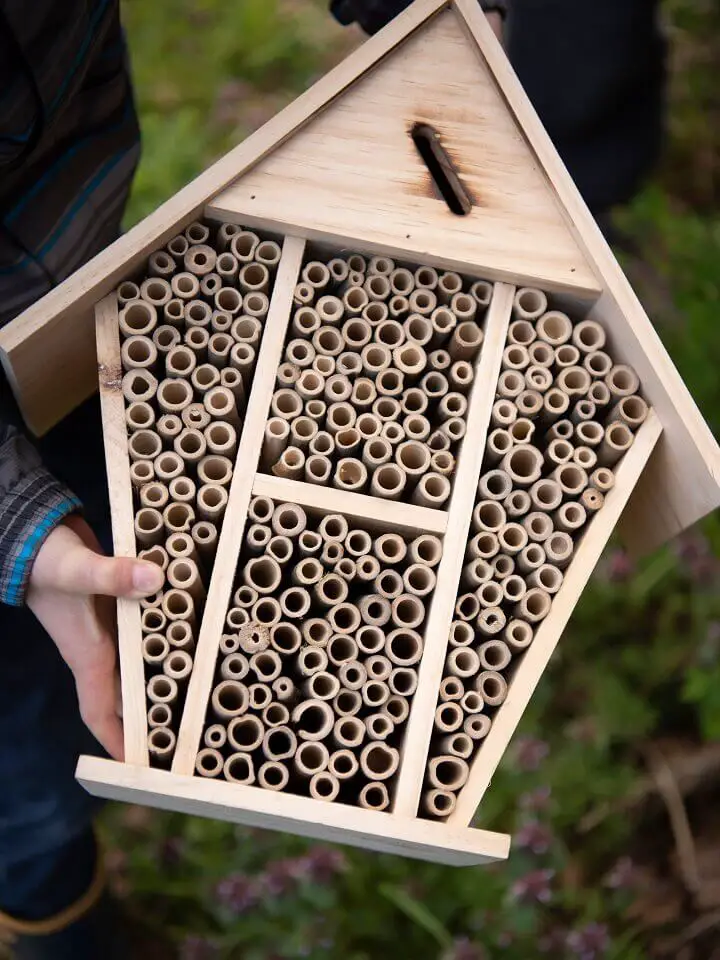
4. Don’t Treat Plants When They’re in Bloom
In the springtime, gardens are often buzzing with activity as bees pollinate flowers in search of nectar. However, this is also the time when many gardeners reach for their pesticide sprays in an effort to control pests.
Unfortunately, this can be harmful to bees, as they can mistake the pesticides for nectar and take it back to their hive. Ortho scientists have found that the best way to protect bees is to avoid spraying pesticides when plants are in bloom.
By timing treatments for garden pests when bees are less active, you can help to keep these important pollinators safe.
5. Try Essential Oils
Essential oils are a great way to keep garden pests at bay without harming bees. Just add a few drops of oil to a spray bottle with water and spritz your plants. The scent of the oil will repel pests, but it won’t harm bees or other beneficial insects.
You can also try diffusing essential oils in your garden. Just add a few drops of oil to a diffuser and set it up near your plants. The scent of the oil will help to keep pests away and create a relaxing atmosphere in your garden.
6. Use Companion Planting Methods
One of the most important things to consider when starting a garden is what plants will work well together. This method of planting is called companion planting, and it can be used to naturally stop garden pests without harming bees.
One way to do this is to plant marigolds near vegetables. The strong scent of the marigolds will help to deter pests, and the flowers will also attract bees, which will help pollinate your vegetables.
Another option is to plant nasturtiums near cucumbers. The nasturtiums will act as a trap crop, attracting aphids away from the cucumbers. In addition, the peppery leaves of the nasturtium will make it difficult for pests to digest.
As a result, they will quickly move on to another plant. By using companion planting methods, you can create a healthy garden that is free of harmful pesticides and attract bees that are essential for pollination.
7. Rotate Crops
By planting different crops in different areas from year to year, you can disrupt the life cycle of pests and prevent them from gaining a foothold in your garden. Additionally, rotating crops helps to ensure that the soil remains healthy and productive.
Over time, plants deplete the soil of nutrients, so rotating crops allows different plants to access the nutrients they need. As a result, crop rotation is an effective way to control pests while also protecting bees and promoting soil health.
8. Try Beneficial Insects
One of the most effective is to encourage natural predators, such as ladybugs, lacewings, and ground beetles.
9. Pick Off the Pests
One more simple way to get rid of garden pests without killing the bees? Just remove them by hand. You can also use a vacuum cleaner. Drop the bugs in a pot of soapy water to get rid of them.
10. Attract Hummingbirds
Hummingbirds are natural predators of many common garden pests, and they are also pollinators. By creating a garden that is attractive to hummingbirds, you can provide them with a source of food while also protecting your plants. So how do you attract these beautiful birds?
Start by planting flowers that are native to your area. Hummingbirds are attracted to brightly colored blossoms, so choose flowers in shades of red, orange, and yellow. In addition, be sure to provide a water source, as hummingbirds need to drink regularly. A simple bird bath or even a dripping hose will suffice.
11. Make Traps
Traps are also a great way to control garden pests. For example, yellow sticky traps can be used to catch aphids, whiteflies, and other small insects. To make your own trap, simply cut a yellow piece of paper into small squares and coat it with petroleum jelly or vegetable oil. Then place the squares around your plants.
You can also try using bait traps for snails and slugs. Bury a cup or bowl so that the opening is level with the ground then fill it with beer. The snails and slugs will be drawn to the beer and will drown in the trap. Check the traps regularly and empty them as needed.
12. Use Neem Oil
Neem oil is a natural pest control option that is safe for bees and other pollinators. Derived from the neem tree, neem oil works by disrupting the life cycle of pests. It interferes with their ability to feed, mate, and lay eggs, effectively stopping the next generation from taking over your garden.
In addition, neem oil has antifungal properties that can help to prevent diseases from taking hold. For best results, apply neem oil early in the season before pests have a chance to become established. With regular applications, you can keep your garden healthy and free of harmful chemicals.
13. Try DIY Repellents
There are many recipes for homemade repellents that can be used to keep garden pests at bay. One popular option is to mix equal parts water and vinegar in a spray bottle.
You can also add a few drops of lemon juice or essential oils for extra scent. Another good choice is crushed garlic mixed with water. These repellents should be applied every few days for best results.
14. Don’t Be Afraid of Mulch
Gardeners have many tools at their disposal for combating pests, but some of the most effective methods can also be harmful to bees.
For example, pesticides can kill bees outright, while herbicides can damage the flowers that they rely on for food.
Mulching, on the other hand, is a safe and effective way to keep pests out of your garden without harming bees. Made from organic materials like wood chips or straw, mulch helps to suppress weed growth and prevent soil erosion. It also provides a physical barrier that discourages pests from entering your garden in the first place.
And because it is made from natural materials, mulch breaks down over time and actually helps to improve the quality of your soil. So don’t be afraid to use mulch in your garden—it just might be the best way to keep both pests and bees away.
15. Blast Them Away With Water
Water is not only a refreshing way to cool down on a hot day, but it can also be used as an effective tool for blasting away garden pests. A high-pressure stream of water is strong enough to dislodge most pests, including aphids, earwigs, and mealybugs, without causing harm to beneficial insects like bees.
For best results, direct the water at the underside of leaves, where pests are most likely to congregate. Not only will this help to protect your plants, but it will also provide a refreshing drink for any bees that happen to be in the area.
16. Use Floating Row Covers
Garden pests can cause serious damage to your plants, and controlling them can be a difficult and time-consuming task. Fortunately, there is a way to stop garden pests without harming bees.
Floating row covers are a type of fabric that helps to protect plants from pests while still allowing water and sunlight to reach the leaves. The fabric is held in place by stakes or hoops, and it can be removed easily when you need to access your plants. In addition, floating row covers can be used repeatedly and will last for many years.
Best of all, they are completely safe for bees, so you can rest assured that your pollinators will not be harmed. Whether you are dealing with caterpillars or beetles, floating row covers are an effective way to keep your garden pest-free.
17. Keep the Garden Tidy and Free of Debris
A tidy garden is less likely to harbor molds, fungi, and other pests, which can quickly infest neighboring plants. Furthermore, by removing fallen leaves and debris, you can help to prevent pests from laying their eggs in your garden.
However, it is important to take care when disposing of garden waste, as many common pesticides can be harmful to bees and other pollinators.
Instead, consider using physical barriers such as netting or diatomaceous earth, which are effective at deterring pests without harming beneficial insects.
18. Educate Friends and Family Members on the Importance of Bees
As the popularity of gardening grows, so does the use of pesticides and other harmful chemicals. While these products may be effective at killing pests, they can also do serious damage to bees and other pollinators.
Unfortunately, many people are unaware of the threat that these products pose to bees. As a result, it is important to educate friends and family members on the importance of bees and the need to protect them. One way to do this is to encourage them to use natural pest control methods instead of pesticides.
This may require a bit more effort on their part, but it will help to ensure that bees are able to continue doing the important work of pollination. In addition, spreading the word about the importance of bees can help to create a greater public awareness of the need to protect them.
Final Thoughts
While pesticides are an effective way to get rid of garden pests, they can also be harmful to bees. If you want to stop garden pests without harming bees, there are a few bee-friendly ways to do so. Try using these tips the next time you have an infestation in your garden.
Like this post? Don't Forget to Pin It On Pinterest!

